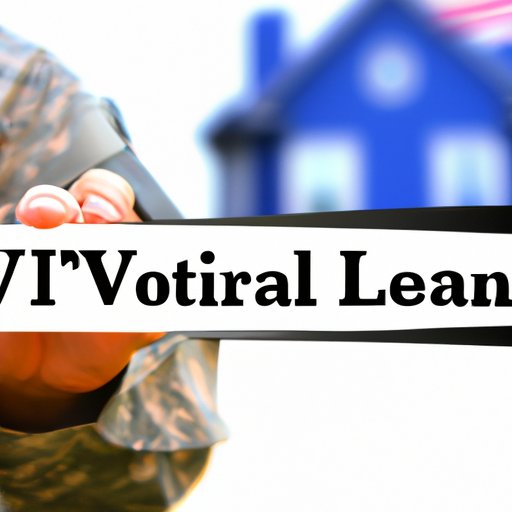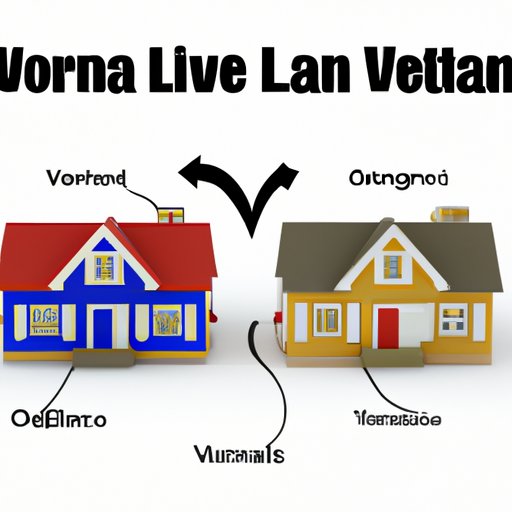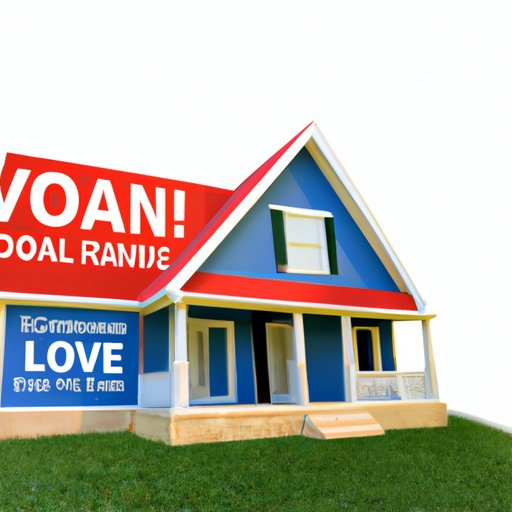Introduction
A VA loan is a loan provided by the U.S. Department of Veterans Affairs (VA) that helps veterans and active military personnel purchase a home. The VA does not actually lend money, but instead provides a guarantee to lenders that if the loan goes into default, the VA will repay a portion of the debt. This makes it easier for veterans to get approved for a loan, since the risk to the lender is reduced.
Overview of VA Loans and How They Work
VA loans are available to any veteran who has served in the armed forces, as well as their surviving spouses. The loans are offered through private lenders, such as banks and mortgage companies, and are backed by the VA. This means that if a borrower defaults on the loan, the VA will pay back a portion of the loan amount.
VA loans come with a variety of benefits, including lower interest rates, no down payment, and flexible financing terms. Additionally, they do not require private mortgage insurance, which can save borrowers thousands of dollars over the life of the loan.

Reasons to Consider a VA Loan
VA loans offer many advantages for veterans and active military personnel. According to the Consumer Financial Protection Bureau (CFPB), VA loan recipients are less likely to experience foreclosure than other types of borrowers. Additionally, VA loans often have lower interest rates than conventional loans and may require no down payment.
Veterans may also be able to access special grants and assistance programs through the VA, such as the Native American Direct Loan Program, which provides direct loans for Native American veterans to purchase, build, or improve a home on Federal Trust land.

Qualifying for a VA Loan
In order to qualify for a VA loan, applicants must meet certain eligibility requirements. Generally, these include:
- Being an active duty service member, veteran, or eligible surviving spouse
- Having a valid Certificate of Eligibility (COE)
- Meeting income and credit requirements
- Having a satisfactory credit history
In addition to meeting the eligibility requirements, applicants must also provide documentation to prove their service record and financial situation. This can include a DD-214 form, pay stubs, tax returns, and bank statements.
Benefits of Taking Out a VA Loan
VA loans offer a number of benefits for borrowers. One of the most significant is the fact that VA loans typically have lower interest rates than conventional loans. According to the CFPB, VA loans had an average interest rate of 3.42% in 2020, compared to 3.81% for conventional loans.
Another major benefit of VA loans is that they do not require a down payment. This makes them a great option for first-time homebuyers who may not have the funds available for a large down payment.
Finally, VA loans offer flexible financing terms. Borrowers can choose a fixed-rate or adjustable-rate loan, and can even refinance an existing loan into a VA loan.

Comparing VA Loans to Other Home Loan Options
When comparing VA loans to other types of home loans, it’s important to consider the costs and benefits of each option. Here’s a look at how VA loans compare to conventional, FHA, and USDA loans:
Conventional Loans
Conventional loans are offered by private lenders and typically require a down payment of at least 5%. These loans tend to have higher interest rates than VA loans, and may also require private mortgage insurance. However, they may be a good option for borrowers with good credit and a steady income.
FHA Loans
FHA loans are insured by the Federal Housing Administration and may require a down payment of only 3.5%. They tend to have slightly higher interest rates than VA loans, but may be a good option for borrowers with lower credit scores or limited savings. Like conventional loans, FHA loans may require private mortgage insurance.
USDA Loans
USDA loans are offered by the U.S. Department of Agriculture and are designed for rural homebuyers. They do not require a down payment and have low interest rates. However, borrowers must meet certain income requirements and must purchase a home in an eligible area.
The VA Loan Process Step by Step
The VA loan process generally follows these steps:
- Pre-approval: Borrowers should obtain pre-approval from a lender before beginning the loan process.
- Application: Once pre-approved, the borrower must complete an application and provide all necessary documentation.
- Underwriting: The lender will review the application and verify the borrower’s income and credit history.
- Closing: If approved, the borrower will sign the loan documents and close on the loan.
Tips for Getting Approved for a VA Loan
Getting approved for a VA loan can be tricky, so it’s important to take steps to increase your chances of success. Here are a few tips to keep in mind when applying for a VA loan:
- Improve Your Credit Score: A good credit score is essential for getting approved for a VA loan. Make sure to pay your bills on time and reduce your debt as much as possible.
- Manage Your Debt: Lenders want to see that you can manage your debt responsibly. Try to keep your debt-to-income ratio below 43% and make all payments on time.
- Provide Documentation: Be sure to provide all necessary documents to your lender, such as proof of income and bank statements.

Common Mistakes to Avoid When Applying for a VA Loan
Applying for a VA loan can be complicated, and there are several common mistakes that borrowers should avoid. These include:
- Not Shopping Around: It’s important to shop around and compare offers from multiple lenders to find the best deal.
- Not Meeting Deadlines: Missing deadlines can lead to delays in the loan process, so be sure to meet all deadlines.
- Not Reading the Fine Print: Be sure to read all documents carefully before signing to make sure you understand the terms of the loan.
Conclusion
VA loans are an excellent option for veterans and active military personnel looking to purchase a home. They offer a number of benefits, including lower interest rates, no down payment, and flexible financing terms. To ensure a successful loan process, it’s important to understand the eligibility requirements, prepare the necessary documentation, compare offers from multiple lenders, and read the fine print of any loan agreement.
(Note: Is this article not meeting your expectations? Do you have knowledge or insights to share? Unlock new opportunities and expand your reach by joining our authors team. Click Registration to join us and share your expertise with our readers.)
